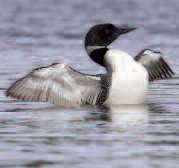New regs on lead sinkers now in effect
 by Roland D. Hallee
by Roland D. Hallee
A press release came across my desk this week from the Maine Department of Inland Fisheries and Wildlife that I thought I would share with you regarding the use of lead sinkers in the state of Maine.
Lead poisoning has long been the leading cause of death for adult loons in Maine. In order to protect loons from lead poisoning resulting from the ingestion of lead fishing tackle, beginning in September 2016 it is illegal in Maine to sell bare (unpainted) lead-headed jigs less than 2.5 inches long. In September 2017, the use of these jigs will also be banned. Although painted lead jigheads are equally harmful to loons (the paint wears off in a matter of days in the loons acidic gizzard), they are not included in the current regulations.

Photo by Marla Brin
Lead poisoning was responsible for almost one third of the documented mortality of adult loons in Maine prior to the implementation of Maine’s first lead regulations in 2002. “Adult loons either ingest lead when they catch fish with lead sinkers and jigs attached, or they pick up lead objects while eating the gravel they need to digest their food from lake bottoms,” said Susan Gallo, Maine Audubon wildlife biologist. Ingested objects like sinkers and jigs stay in loon gizzards, wearing down and elevating lead levels in blood and body tissues. Loons usually die from lead poisoning in a matter of weeks.
After An Act to Protect Maine’s Loons by Banning Lead Sinkers and Jigs (LD 730) was passed in 2013, Maine Audubon, along with many partners including the Department of Inland Fisheries and Wildlife (DIFW), Sportsman’s Alliance of Maine, Bass Nation, and the Maine Lakes Society, created the Fish Lead-Free Initiative, a coalition with the goal of helping anglers make the switch to lead-free tackle.
“We wanted to get the word out to anglers that making the switch to lead-free can be easy now that there are so many products available for purchase in local stores and online,” said Gallo, who is spearheading the initiative. “Using lead-free tackle will make an enormous difference for loons. We are already seeing a significant reduction in loon mortality.”
Fish Lead-Free conducts outreach efforts to educate the public about the importance of fishing with lead-free tackle, including a website (fishleadfree.org) that outlines Maine’s tackle regulations and lists retailers and online outlets where lead-free tackle can be purchased. Fish Lead-Free also hosts tackle exchanges and provides interested individuals or community groups with lead exchange “kits” stocked with lead-free tackle that can be given out at public events, like fishing derbies or tournaments. Plus, Fish Lead Free has provided 350 tackle boxes stocked with lead-free tackle to the DIFW Hooked on Fishing Program.
To increase awareness of the Fish Lead Free effort, Maine Audubon reached out to other states in an effort to create unity in messaging about the importance of lead-free fishing. New Hampshire was the first state to join Maine, creating outreach materials that integrate the Fish Lead Free logo and standard messaging. And last year, four more states contributed information to the Fish Lead-Free website to let anglers know of state-specific tackle regulations and local lead-free tackle sources.
“We’re so glad to see the loon protection regulations phased in and want to help anglers comply with the new laws,” said Gallo.
Organizations interested in hosting a tackle exchange or a presentation on loons and the importance of fishing without lead tackle should contact Susan Gallo via email at sgallo@maineaudubon.org. More information about Fish Lead Free is at http://www.fishleadfree.org.
After initial lead regulations in 2002 banned the use of lead sinkers less than a half ounce, there was a slight drop in adult loon mortality, with just over 23 percent of the loon carcasses collected between 2002 and 2012 determined to have died from lead poisoning. In 2013, An Act to Protect Maine’s Loons (LD 730) banned the sale and use of lead sinkers an ounce or less. Since that time, mortality due to lead poisoning has dropped to just under 20 percent of the carcasses collected.
Please visit www.maineaudubon.org for more information.
Responsible journalism is hard work!
It is also expensive!
If you enjoy reading The Town Line and the good news we bring you each week, would you consider a donation to help us continue the work we’re doing?
The Town Line is a 501(c)(3) nonprofit private foundation, and all donations are tax deductible under the Internal Revenue Service code.
To help, please visit our online donation page or mail a check payable to The Town Line, PO Box 89, South China, ME 04358. Your contribution is appreciated!


Leave a Reply
Want to join the discussion?Feel free to contribute!